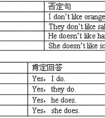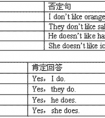单句改错。1. What can her sister does? AB C2. We want two music for our rock band.A B C3. What club does her uncle want to joining? A B C4. Ben's father -七年级英语
I often help him these days. 这些日子我经常帮助他。
I always remember the day when I first came to this school.
我常常记得我第一次来学校的那一天。
You mustn't always help me. 你不能老是帮助我。
He seldom comes to see us. 他很少来看我们。
We usually go shopping once a week. 我们通常一周买一次东西。
The new students don't always go to dance. 新学生并不时常去跳舞。
4、疑问副词,连接副词,关系副词以及修饰整个句子的副词,通常放在句子或从句的前面。
When do you study everyday? 你每天什么时间学习?
Can you tell me how you did it? 你能告诉我你如何做的吗?
First, let me ask you some questions. 先让我来问几个问题。
How much does this bike cost? 这辆车子多少钱?
Either you go or he comes. 不是你去就是他来。
The students were reading when the teacher came into the classroom. 当老师进教室时,学生们正在读书。
5、时间副词和地点副词在一个句中, 地点副词在前面时间副词在后面。
We went shopping in the supermarket at 9 o'clock yesterday.
昨天九点钟我们到超市买东西了.
What were you doing in the classroom yesterday afternoon?
昨天下午你在教室里干什么?
The accident took place in the Eleven Avenue one hour ago.
一小时前十一号大街发生了一场事故。
6、否定副词在句首,句子要倒装,如:
Never have I felt so excited!
1) close与closely
close意思是"近"; closely 意思是"仔细地"
He is sitting close to me.
Watch him closely.
2) late 与lately
late意思是"晚"; lately 意思是"最近"
You have come too late.
What have you been doing lately?
3) deep与deeply
deep意思是"深",表示空间深度;deeply时常表示感情上的深度,"深深地"
He pushed the stick deep into the mud.
Even father was deeply moved by the film.
4) high与highly
high表示空间高度;highly表示程度,相当于much
The plane was flying high.
I think highly of your opinion.
5) wide与widely
wide表示空间宽度;widely意思是"广泛地","在许多地方"
He opened the door wide.
English is widely used in the world.
6) free与freely
free的意思是"免费";freely 的意思是"无限制地"
You can eat free in my restaurant whenever you like.
You may speak freely; say what you like.
副词有加a或ly的 区别在于通常加a 的副词描述一种状态,而加ly 的副词则倾向于感觉。
考点名称:从属连词
- 从属连词:
这种连词是用以引导名词性从句定语从句和状语从句的,由从属连词所引导的句子叫从句,而含有从句的句子叫作复合句。 从属连词可分为三大类:
1、that (无词义,不做成分)
if,whether (表达是否的意义,但不做句子成分)
2、连接代词:who,whom,whose,what,which,whatever, whoever, whichever(有词义,在句子中可作主语、表语、宾语)
3、连接副词:when,where,why,how,how many,how long,how far,however,whenever,wherever (有词义,作从句的状语)用法:
从结构上说,英语连接词分两大类:并列连词和从属连词。
并列连词连接两个或两个以上地位平等的字、词组或分句。例如:
(1) Air and water are indispensable to me.
(2) She likes going out with friends or playing outdoor games.
(3) Most workers have a good income, so they look very happy.
从属连词连接两个或两个以上的分句,形成复杂句中的从属分句。例如:
(4) He said that he did not want to go .
(5) Many things have happened since I last saw him.
(6) You may come if you want to.
从属连词用来连接各种从句。
until(till)直到,在用until表达时间状语的句子中,主句中的动词是要十分小心去选择的。
如动词是持续行动词,它要用肯定句,如:
I studied hard until 12 o'clock last night.
如果动词是瞬间截止性动词,则要用否定句,如:
He didn't go to bed until his mother came back.
由since,for,by,before, 来引导的时间状语从句。
since 引导的时间状语是动作的开始时间,如:
I have studied English since 1990.
而by引导的时间状语通常是动作的结束时间,如:
I had learned 25 English songs by the end of last term.- 从属连词语法分类:
种类 语法作用 连词举例 从属连词 引导原因状语从句 Because, since 引导条件状语从句 If, unless, as long as 引导目的状语从句 So that 引导结果状语从句 So…that 引导方式状语从句 As, just as, as if 引导让步状语从句 Though, although, even
though, no matter what,
however, no matter how,
whoever, no matter who,
wherever, no matter where引导比较状语从句 As…as, not so…as, than,
less…than, the more…the
more引导名词性从句 Who, whom, whose, which,
that, when, where, why
- 最新内容
- 相关内容
- 网友推荐
- 图文推荐
| [家长教育] 孩子为什么会和父母感情疏离? (2019-07-14) |
| [教师分享] 给远方姐姐的一封信 (2018-11-07) |
| [教师分享] 伸缩门 (2018-11-07) |
| [教师分享] 回家乡 (2018-11-07) |
| [教师分享] 是风味也是人间 (2018-11-07) |
| [教师分享] 一句格言的启示 (2018-11-07) |
| [教师分享] 无规矩不成方圆 (2018-11-07) |
| [教师分享] 第十届全国教育名家论坛有感(二) (2018-11-07) |
| [教师分享] 贪玩的小狗 (2018-11-07) |
| [教师分享] 未命名文章 (2018-11-07) |


![How much does it ______ to fly from Yancheng to Hainan Island?[ ]A. cost B. payC. spend D. take-七年级英语](http://www.00-edu.com/d/file/ks/4/2/shiyidongci/2020-01-05/small7dcf2f05998de63e10cc3629787031c81578210087.png)

![He always _____TV in the evening. He _____ listening to the radio. [ ]A. watch, don't like B. watches, doesn't like C. watching, don't like D. watch, do-七年级英语](http://www.00-edu.com/d/file/ks/4/2/shiyidongci/2020-01-05/small45d599b4a60b84e61cec210bfbf051f51578214524.png)
![I'd rather ___ to the Mcdonald's Restaurant because I like to listen to quiet music.[ ]A. to go B. going C. go D. went-八年级英语](http://www.00-edu.com/d/file/ks/4/2/shiyidongci/2020-01-05/small1767bba1727fef2c035c53dcbd9bc20e1578209517.png)
